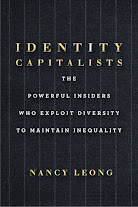Nancy Leong’s Identity Capitalists: The Powerful Insiders Who Exploit Diversity to Maintain Inequality is a powerful book that argues through a number of case studies that identity capitalism is a process in which an ingroup benefits from outgroup identity. In North America, as are well aware, the main ingroup is usually white, male, heterosexual, and wealthy. Identity capitalism is also a business strategy. Just professing the value of diversity helps to exonerate a company’s image at a time of negative publicity.
A lot of institutions dishonestly use racial photoshopping to inflate diversity. Have you ever noticed the meticulousness of diversity when in reality the staff is completely homogenous? Leong reveals that campuses often photoshop Black students into group photos. Identity capitalism implies that social problems are easy to solve or have been solved already, yet in reality are only a superficial and performative gesture toward a solution. The better diversity statement is an honest one: touting the company’s accomplishments but explaining there is more work to do within and beyond the company itself. There is always a wonderful opportunity to be humble and grow.


No comments:
Post a Comment